Yes, email marketing is legit. It is a proven method to engage audiences and boost sales.
Businesses use it to connect with customers effectively. Email marketing is a trusted tool in the digital world. It helps businesses reach their target audience directly. With personalized messages, companies can build strong relationships. Email marketing has been around for decades, showing its reliability.

It’s cost-effective, making it ideal for small and large businesses alike. By understanding your audience, you can tailor content to their needs. This approach increases the chances of conversion.
Despite the rise of social media, email remains a key player. It offers a direct line to your customers’ inboxes, making it a valuable asset.
So, is email marketing legit? Absolutely. It is a vital part of any successful marketing strategy.
Table of Contents
ToggleIntroduction To Email Marketing
Email marketing has become a powerful tool for businesses. It helps in reaching customers directly. But is email marketing legitimate? Let’s dive into the basics and history of email marketing.
What Is Email Marketing?
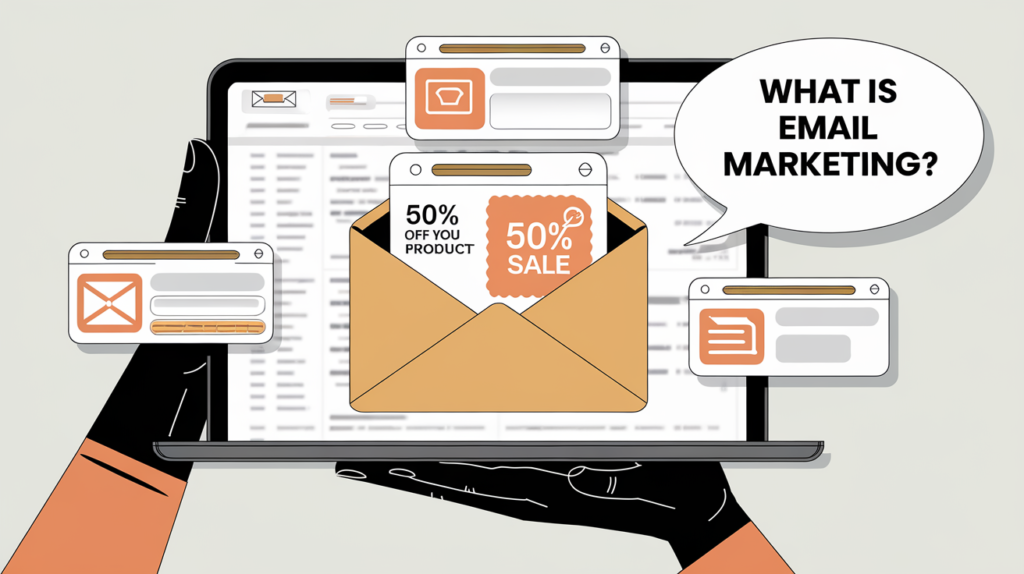
Email marketing involves sending emails to a list of subscribers. These emails may promote products, share news, or provide valuable content. Businesses use email marketing to build relationships with customers. It is a cost-effective way to communicate.
Historical Background
Email marketing started in the late 1970s. Gary Thuerk sent the first mass email in 1978. He was promoting a new product. That email reached about 400 people. It led to $13 million in sales. This success marked the beginning of email marketing.
In the 1990s, email marketing gained popularity. The internet has become more accessible. Businesses saw the potential of reaching customers through email. The CAN-SPAM Act of 2003 set rules for commercial emails. It aimed to protect consumers from spam. This law made email marketing more legitimate.
Today, email marketing is a key part of digital marketing. Businesses use it to engage with customers. It has evolved with technology. Now, marketers can track open rates and click rates. This data helps in improving email campaigns. Email marketing continues to grow and adapt.
Legitimacy Of Email Marketing
Email marketing has been a powerful tool for businesses. But, is it legitimate? Many people wonder if it’s ethical or even legal. Let’s dive deeper into the legitimacy of email marketing.
Legal Regulations
Many countries have laws that govern email marketing. These laws ensure that companies respect consumer rights. For example, the CAN-SPAM Act in the USA sets rules for commercial emails. It gives recipients the right to stop receiving emails. It also outlines penalties for violations.
| Country | Relevant Law | Key Requirements |
|---|---|---|
| USA | CAN-SPAM Act | Unsubscribe option, accurate subject lines |
| EU | GDPR | Consent, data protection |
| Canada | CASL | Consent, sender identification |
These regulations help maintain the legitimacy of email marketing. They protect consumers from spam and unethical practices.
Ethical Considerations
Beyond legal requirements, ethical considerations are crucial. Businesses must respect their audience. This means sending relevant content. It also means not overwhelming subscribers with too many emails.
- Permission-based emails: Always get consent before adding someone to your list.
- Transparency: Be clear about who you are and why you’re emailing.
- Value: Ensure your emails offer value to the recipient.
Ethical email marketing builds trust. It also leads to better engagement and customer loyalty.
By following both legal and ethical guidelines, businesses can ensure their email marketing is both legitimate and effective.
Benefits Of Email Marketing
Email marketing is a powerful tool. It helps businesses reach their audience directly. This method offers many benefits. Let’s explore some of the key advantages.
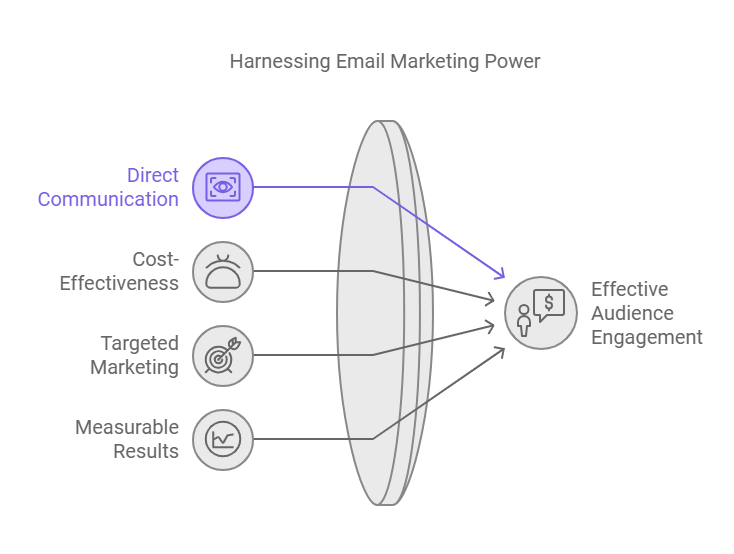
Cost-effectiveness
Email marketing is affordable. It costs less than traditional marketing methods. You do not need to spend much on print or postage. Many email marketing tools offer free or low-cost plans. Small businesses can benefit from these plans. You can reach many people without breaking the bank.
Another advantage is the high return on investment (ROI). You can track your spending and results. This helps in making informed decisions. You can adjust your strategies based on performance. This ensures you get the best value for your money.
Wide Reach
Email marketing has a broad reach. You can connect with people across the globe. An email can be sent to thousands of recipients at once. This helps in growing your audience.
Many people use email daily. This means your message is likely to be seen. You can also segment your audience. This allows for personalized messages. Personalized emails have higher engagement rates.
Email marketing helps in building relationships. You can share news, updates, and promotions. This keeps your audience informed and engaged. Over time, this can lead to increased loyalty and sales.
Email Marketing Strategies
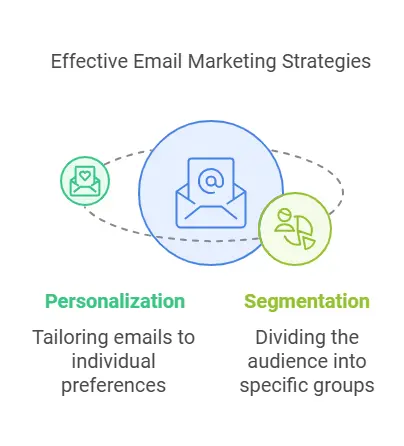
Email marketing is one of the most effective ways to reach your audience. But, for it to be successful, you need to use the right strategies. This section will cover some key strategies, including personalization and segmentation, to help you get the most out of your email campaigns.
Personalization
Personalization is crucial in email marketing. It makes your emails feel relevant and engaging to the reader. Here are some ways to personalize your emails:
- Use the recipient’s name in the subject line and greeting.
- Send emails based on user behavior, such as past purchases or website visits.
- Create customized content based on customer preferences.
By personalizing your emails, you make each recipient feel valued. This can lead to higher open and click-through rates.
Segmentation
Segmentation involves dividing your email list into smaller groups. This allows you to send more targeted and relevant content.
Here are some ways to segment your list:
- Group by demographics such as age, gender, or location.
- Segment based on purchase history.
- Consider engagement levels, like how often someone opens your emails.
Segmenting your email list helps you deliver the right message to the right audience. This improves your campaign’s effectiveness and helps build a stronger relationship with your subscribers.
By focusing on personalization and segmentation, you can make your email marketing efforts more successful. These strategies ensure your emails are relevant and engaging, leading to better results.
Effective Email Campaigns
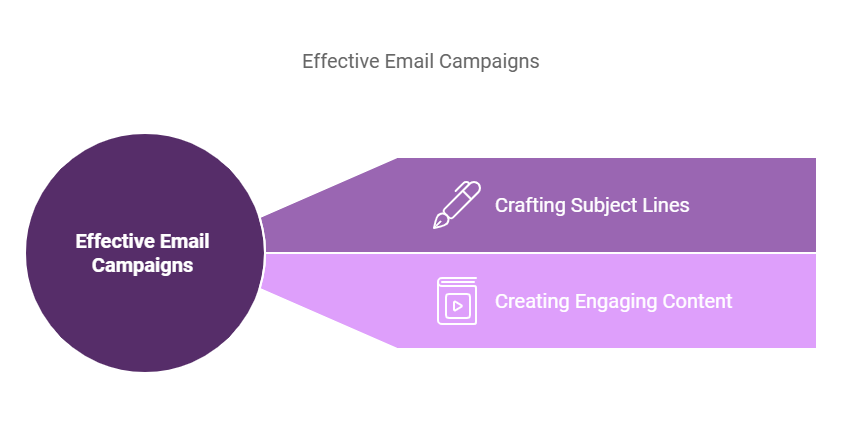
Email marketing is a powerful tool for businesses. But, to make it work, you need effective email campaigns. These campaigns can help you connect with your audience. They can also drive sales and build brand loyalty.
Creating effective email campaigns involves several key elements. Let’s explore two of the most important aspects: crafting subject lines and creating engaging content.
Crafting Subject Lines
The subject line is the first thing your reader sees. A good subject line can make or break your email campaign. It needs to be catchy and relevant.
Here are some tips for crafting effective subject lines:
- Keep it short: Aim for 6-10 words.
- Use action words: Words like “get,” “try,” or “discover” can grab attention.
- Personalize it: Use the recipient’s name if possible.
- Create urgency: Phrases like “limited time” or “last chance” can prompt action.
- Ask questions: Questions can engage curiosity.
Creating Engaging Content
The content of your email should be engaging and valuable.
Here are some tips to create content that keeps your readers interested:
- Be concise: Get to the point quickly.
- Use clear language: Avoid jargon and complex words.
- Include visuals: Images and videos can make your email more appealing.
- Add a call-to-action: Tell your readers what you want them to do next.
- Make it mobile-friendly: Ensure your email looks good on mobile devices.
Remember, the goal is to provide value to your readers. If they find your emails useful, they are more likely to engage with your content and take action.
Measuring Success
Email marketing is a powerful tool, but how do you know it’s working? Measuring success is crucial. It helps you understand what’s effective and what needs improvement.
Key Metrics
Several key metrics help measure email marketing success. These metrics provide clear insights into your campaigns.
- Open Rate: The percentage of recipients who open your email.
- Click-Through Rate (CTR): The percentage who click on a link within your email.
- Conversion Rate: The percentage who complete a desired action.
- Bounce Rate: The percentage of emails not delivered.
- Unsubscribe Rate: The percentage who opt out of your email list.
Monitor these metrics to gauge performance. They tell you how your audience is engaging with your content.
A/b Testing
A/B testing, or split testing, is a method to test different versions of an email. It helps identify which one performs better.
Here’s how it works:
- Choose an element to test (e.g., subject line, call-to-action).
- Divide your audience into two groups.
- Send version A to one group and version B to the other.
- Compare the results using key metrics.
A/B testing can improve your email marketing strategy. It helps you understand what resonates with your audience.
For example, you might find that a shorter subject line increases open rates. Or, a different call-to-action boosts conversions.
Regular testing and monitoring of your email campaigns lead to better results. It ensures that your content remains relevant and engaging.
Challenges In Email Marketing
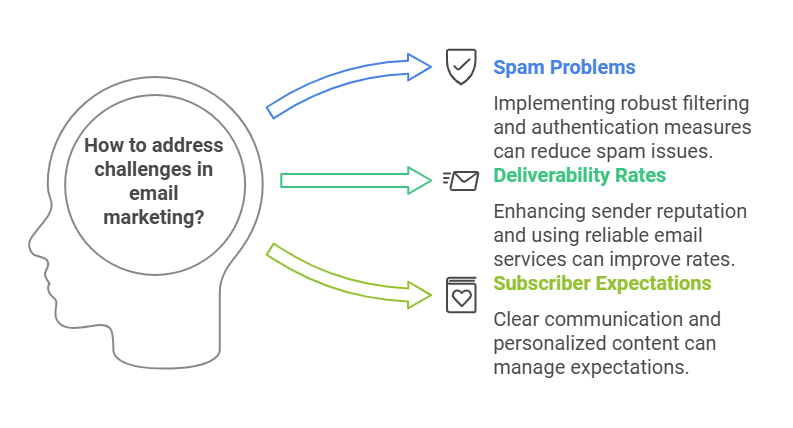
Email marketing can be incredibly effective, but it also faces numerous challenges. These challenges can hinder the success of your campaigns. Some common issues include spam problems, deliverability rates, and managing subscriber expectations. Addressing these challenges is essential for an effective email marketing strategy.
Spam Issues
Spam is a significant challenge in email marketing. Many emails end up in the spam folder. This reduces the chance of them being seen. To avoid this, ensure your emails comply with anti-spam laws. Use a clear subject line.
Avoid using too many links or images. Provide an easy way to unsubscribe. These steps can help reduce the chances of your emails being marked as spam.
Deliverability
Deliverability is another major challenge. Even if your email is not marked as spam, it might not reach the inbox. Email providers use complex algorithms to filter emails. To improve deliverability, maintain a clean email list.
Remove invalid or inactive email addresses. Use a reputable email service provider. Monitor your email campaign metrics. Check bounce rates, open rates, and click-through rates. This helps you understand and improve your deliverability.
Future Of Email Marketing
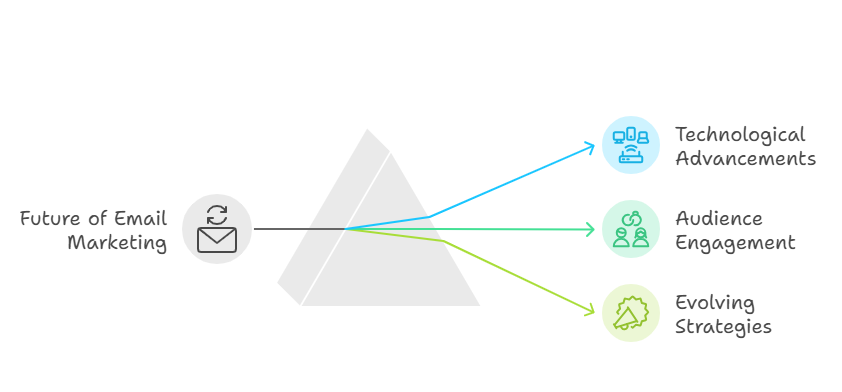
The future of email marketing is bright and full of potential. Email remains a powerful tool for businesses to connect with their audience. With the rise of new technologies, email marketing is evolving fast.
Let’s dive into some emerging trends and technological advancements shaping this field.
Emerging Trends
Personalization is becoming key in email marketing. Brands are now tailoring their emails to individual preferences. This makes emails more relevant and engaging.
Another trend is the use of interactive content. Emails are no longer static messages. They now include quizzes, surveys, and clickable images. This keeps the audience engaged and encourages them to take action.
Technological Advancements
Artificial Intelligence (AI) is transforming email marketing. AI can analyze data and predict customer behavior. This helps in creating more targeted email campaigns. Automation is another significant advancement.
Automated emails save time and ensure timely communication. They can send welcome emails, follow-ups, and special offers without manual effort.
Additionally, advanced analytics provide deeper insights. Marketers can now track email performance in real time. This helps in making data-driven decisions and improving campaign effectiveness. The future of email marketing looks promising with these advancements.
Frequently Asked Questions
What Is Email Marketing?
Email marketing is a digital strategy to promote products or services. It involves sending emails to a targeted audience.
Is Email Marketing Effective?
Yes, email marketing is highly effective. It has a high ROI and allows for personalized communication with customers.
How Do I Start Email Marketing?
To start, choose an email marketing platform. Then, build an email list and create engaging content.
What Are The Benefits Of Email Marketing?
Email marketing offers benefits like cost-effectiveness, high ROI, and direct communication. It also allows for personalized and targeted messages.
Conclusion
Email marketing is a legitimate tool. It helps businesses reach their audience. Simple and cost-effective, it can boost engagement and sales. Keep messages clear and valuable. Respect your subscribers’ preferences. Email marketing, when done right, builds strong customer relationships. Try it and see the benefits for your business.

